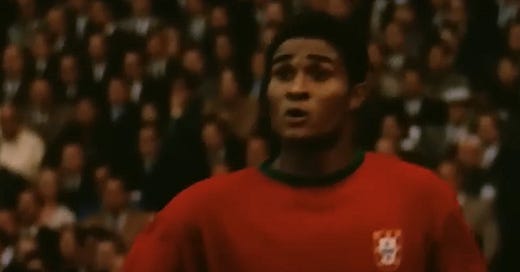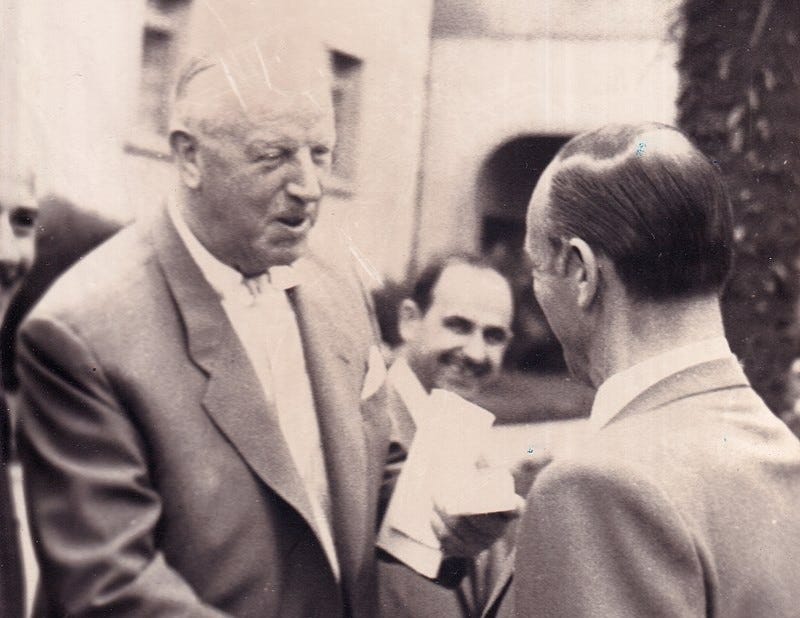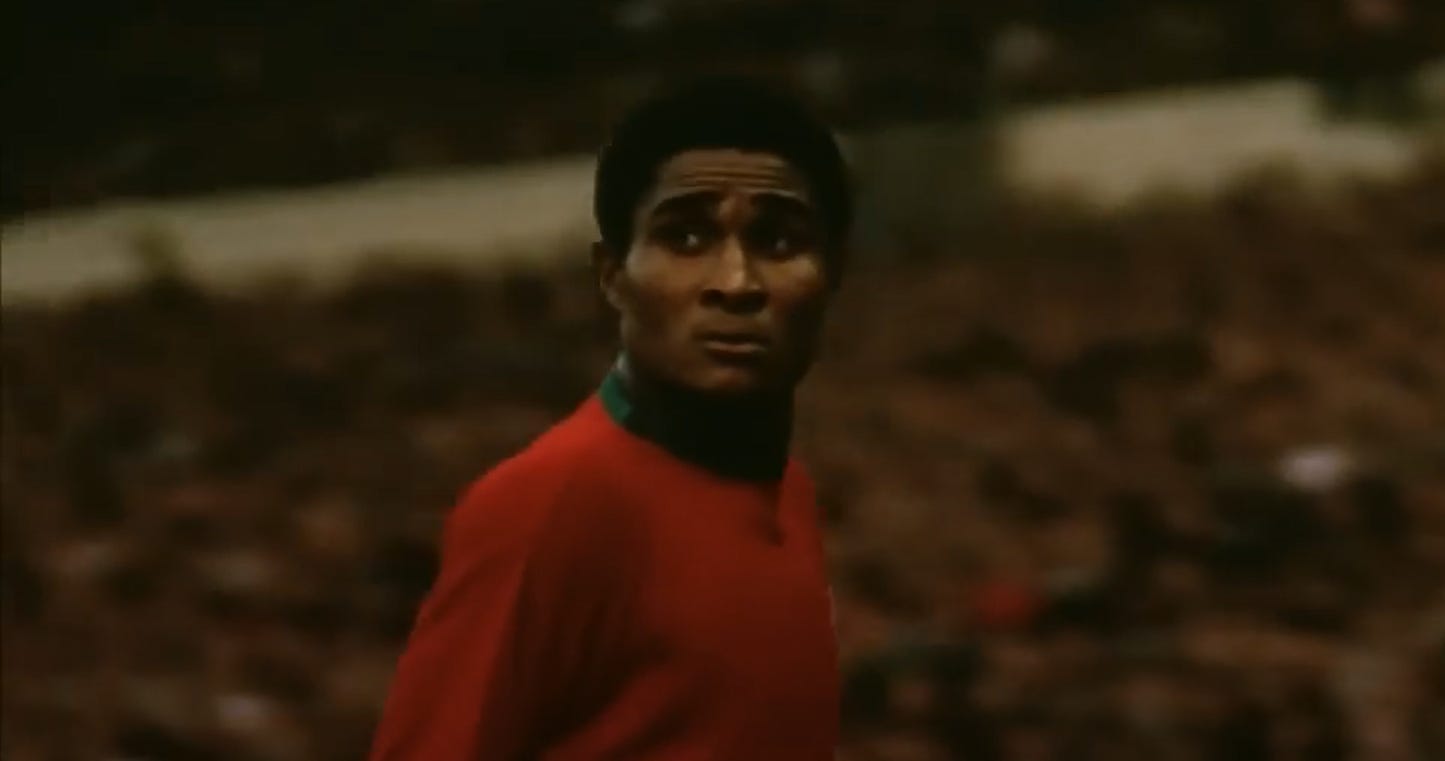When Africa boycotted the World Cup, but still stole the show
How a strong African influence helped Portugal to third place on their World Cup debut, as CAF nations refused to take part
Insulting an entire continent with one remark is quite the achievement. Yet despite never winning a Premier League title — as so many were quick to point out in response — Jamie Carragher did at least manage to incur the wrath of Africa last week by claiming that Africa Cup of Nations was not a “major tournament”.
The comments were made as part of a discussion on Mohamed Salah’s chances of winning the Ballon d’Or, with the former England international claiming;
“The problem is the fact he's with Egypt, and he's probably not playing in the major tournament as such.”
Understandably, a whole host of the great and the good of the African game have come out to criticise Carragher, stating the pride they had in playing in and/or winning Afcon, while many made jibes at his lack of medals with England.
The idea that Afcon — which will be hosted at the end of the year by recent World Cup semi-finalists Morocco, features national teams with rich histories, such as Salah’s Egypt, plus Senegal, Cameroon, Nigeria and many more — is not a major tournament, is ignorant nonsense.
Besides, playing in it did not stop George Weah winning the Ballon d’Or in 1995, the first year non-European players could be nominated for the award.
The debate around what makes a tournament “major” can get ugly quite rapidly when discussing continental championships. Are all six on an equal footing?
It is hard to argue that the OFC Nations Cup is as prestigious as the UEFA European Championship or the Copa América, yet is New Zealand’s win last year any less meaningful than Qatar’s in the AFC Asian Cup, which can certainly claim to be as big as Afcon which, as we know, is a major tournament.
Then, the same people who leapt to Afcon’s defence in recent days made little fuss of the return of the Finalissima in 2022, between the winners of the Euros and Copa América, not questioning why only said victors got to contest the award.
Whatever your position on the Carragher spat, it is just the latest of many snubs African football has faced throughout the years and, unfortunately, unlikely to be the last. For one of the worst, we must turn back to the 1960s.
The history of African teams at the FIFA World Cup in the early decades was little to write home about.
Egypt, who were due to appear at the first edition in 1930, did not even get the chance to write home, as they missed the boat in Marseille after a storm in the Mediterranean delayed their voyage from Cairo.
They at least got to make history four years later, becoming the first African team to take to the field at the finals, having beaten Mandatory Palestine in qualification. They lost 4-2 to Hungary in Naples in their only match and would not qualify for another World Cup until it returned to Italy in 1990.
In 1958, Sudan became only the second African nation to enter qualification, before CAF was first given its own qualification draw in 1962.
Morocco won the four-team qualifying tournament ahead of Ghana, Tunisia and Nigeria. Rather than a place at the World Cup in Chile, that earned Morocco an intercontinental play-off against Spain, which they lost 4-2 on aggregate.
The increase in representation was part of an era of growth in international football on the continent.
In 1957, the first Africa Cup of Nations was held. By 1963, the tournament had doubled in size from a three- to a six-team competition.
Ahead of the 1966 World Cup, 15 members of CAF entered the qualification process, which saw the teams split into six groups as shown below:
The six group winners would advance to the second round, consisting of two-legged knockout ties.
Rather than head to England, it was decided by FIFA in 1964 that the three teams left standing would then play a round-robin with the winners of AFC/Oceania qualification process.
Angered by the decision, all 15 African nations, plus Syria in a show of solidarity, all withdrew from 1966 World Cup qualification.
To make matters worse, FIFA, headed by Englishman Stanley Rous, readmitted South Africa to the federation in 1963 and allowed them to take part in AFC/Oceania qualifying, as they remained banned from CAF due to the apartheid regime.
Former referee Rous supported apartheid and regularly sought ways for South Africa and Rhodesia to compete on the international stage, including floating the idea of a Southern African confederation, to which CAF members threatened to leave FIFA altogether.
Rous deemed the standard of African football — with the exception of African countries with a sizable white population — was not good enough. While someone of a previous era should never be judged by the standards of today, Rous’ views were fairly backward even by 1960s standards.
However, with pressure on FIFA from CAF members, South Africa were banned once more in 1964 and a withdrawal from South Korea left just North Korea and Australia in the race.
In two matches played in Cambodia in November 1965, the North Koreans thrashed Australia 9-2 on aggregate and took the only place at the World Cup for three of the six continents.
But another debutant, located much close to the “home of football”, would ensure that African representation in England would leave a lasting legacy.
Portugal’s African influence
Os Navegadores of Portugal had failed to make waves on the international stage until the 1960s, failing to qualify for every edition of the World Cup.
But Portuguese football was rapidly making a name for itself at the start of the decade, with Benfica twice lifting the European Cup despite Sporting CP and Porto often getting the better of them in domestic competition.
That strong talent pool contributed to Brazilian coach Otto Glória putting together a team that would finally give Portugal hope of reaching the World Cup.
And that is exactly what they did. With four wins and a draw, Portugal topped qualifying Group 4 ahead of Czechoslovakia, Romania and Turkey with a game to spare.
But Glória’s team was not built purely from the suburbs of Lisbon and Porto — in fact, four of his 22-man squad in England were born in Mozambique, as was Costa Pereira, who featured in the qualifiers. Also playing a role in qualification were Miguel Arcanjo and Ferreira Pinto, who were both from Angola.
At the time, both Angola and Mozambique were Portuguese colonies with no recognition by CAF or FIFA. Their players best hopes of a career in the game were to be scouted by the top clubs in Portugal — thankfully, the scouting network was extensive and knowledgeable.
Captaining the side in England was Mário Coluna, from Inhaca in the Indian Ocean. From the Mozambique mainland came defenders Hilário and Vicente, as did the talisman of the side who lit up the tournament, Eusébio.
It is hard to imagine today that the current Ballon d’Or holder and one-time European Cup winner would arrive at a World Cup as something of an unknown quantity, particularly to the host nation. By the time Eusébio left English shores a month later, there wasn’t a football fan in England or around the world who didn’t know his name.
Led by Coluna, Portugal caused an upset in their opening match by beating Hungary 3-1. Hungary’s team of the 1960s was not of the standard of the previous decade, but nonetheless few saw that result coming. Eusébio got off the mark in a 3-0 win over hapless Bulgaria in their second match, before Portugal faced Brazil in their final group match.
Colonial overlords they may have been, but there was little doubt who were mightier on the football pitch. But Brazil, back-to-back winners in 1958 and 1962, were wounded — literally — with Pelé suffering from the endless robust challenges he was victim of in the first two games.
With Pelé nowhere near his brilliant best, Eusébio took on the starring role, scoring twice in a 3-1 win which confirmed Portugal as group winners and sent Brazil out.
A quarter-final tie with North Korea looked to be the stuff of dreams for the Portuguese, but the conquerors of Italy had other ideas. The Koreans were 3-0 up after 25 minutes and on course to be the first Asian side to reach the last four.
But once more, Eusébio inspired Portugal, who completed a remarkable turnaround at Goodison Park. The Black Pearl scored four times before the hour mark to give his team the lead before his club teammate José Augusto rounded off a 5-3 win.
Two Bobby Charlton goals in front of 95,000 fans at Wembley Stadium ended Portugal’s incredible run at the semi-final stage, though at least Eusébio continued his scoring run with a late penalty in a 2-1 loss, before scoring his ninth of the tournament to help beat the Soviet Union 2-1 in the third-place play-off.
In an World Cup boycotted by African teams in large part down to FIFA seeing their football as substandard. An African scored three more goals than anyone else, for a team captained by an African, who knocked out the reigning champions as part of what is still considered one of the best World Cup showings ever by a debutant.
Golden boot winner Eusébio is seen retrospectively as the player of the tournament, while all three Portuguese players named in the all-star team — Eusébio, Coluna and Vicente — were all born in Mozambique.
This is not some feeble attempt to rewrite history — in football terms, those players were Portuguese and only Portuguese and their achievements are part of Portugal’s football history.
Yet, those achievements could not have come at an opportune moment for African football, at a time when it’s teams and competitions were being belittled by European gatekeepers.
Oh, how times have changed.
The boycott worked — an automatic place was granted to CAF for the 1970 World Cup, 40 years after the tournament’s inception and was taken by Morocco. Four years later, Zaire became the first sub-Saharan side to qualify. Such was the belittling they faced from European media, that still today some believe the then-Afcon holders “didn’t know the rules.”
The improvement in attitudes has been gradual, as has been the number of qualification places available.
At the 2026 World Cup, either nine or 10 teams from Africa will make the trip to North America, potentially doubling the continent’s representation from recent editions.
Egypt look to be in a good position to qualify, so at least Mo Salah has a chance to play in another major tournament.
Thank you for reaching the end of this post! If you enjoyed it, please consider sharing it and subscribing to The Full International.
Anthony Tomas is a football writer and commentator, who has written for World Soccer Magazine, MUNDIAL and Flashscore.







